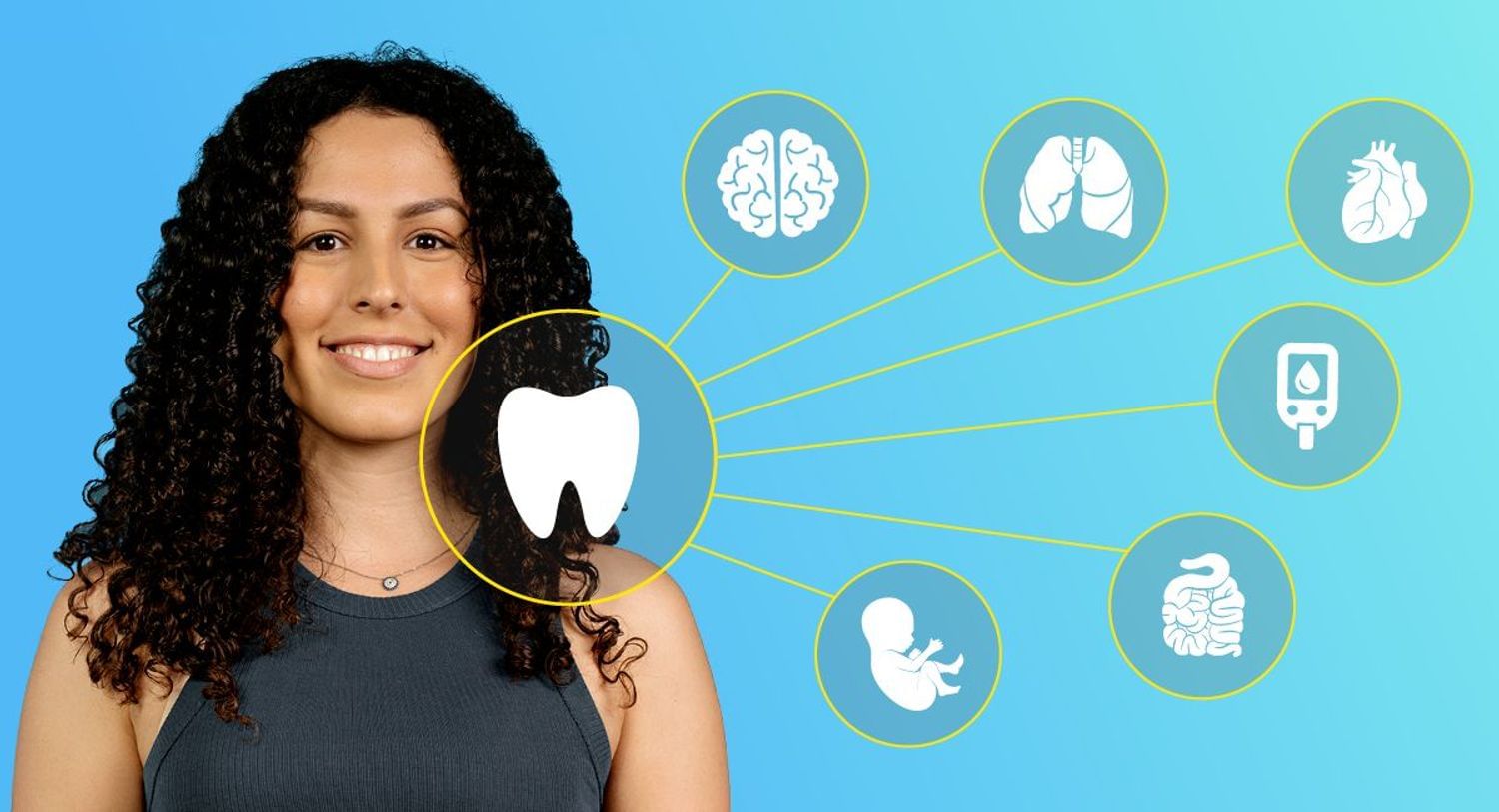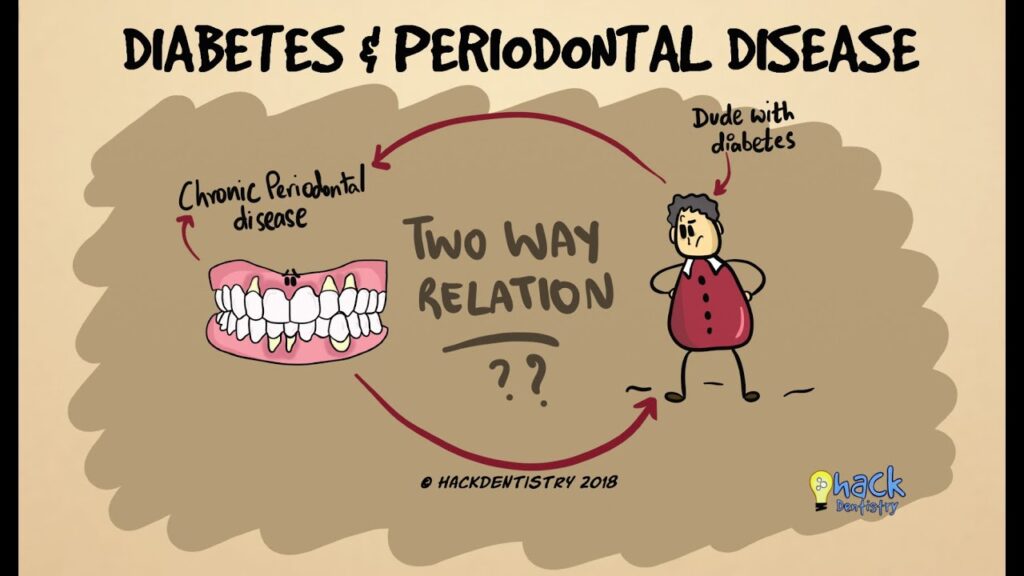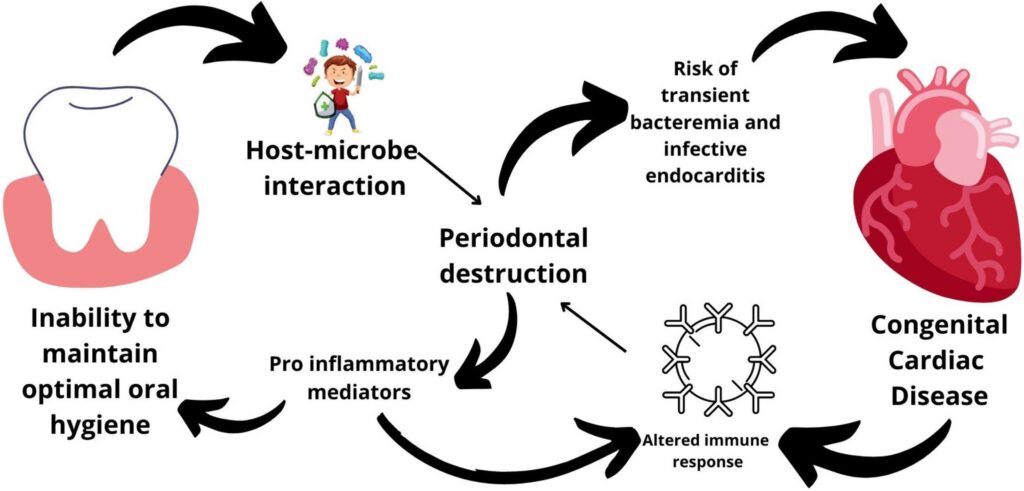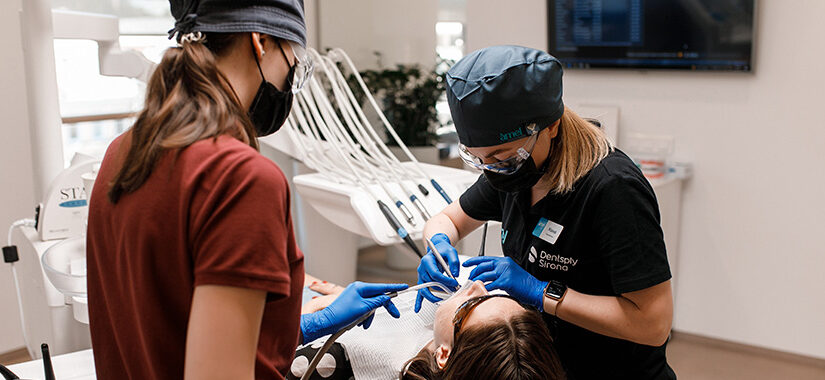The Mouth-Body Connection
The Mouth-Body Connection

Research has recently proven what dentists have long suspected: that there is a strong connection between periodontal disease and other chronic conditions such as diabetes, heart disease and osteoporosis.
Periodontal Disease and Diabetes

Diabetes is a serious, incurable disease that is characterized by too much glucose, or sugar, in the blood. Type II diabetes occurs when the body is unable to regulate insulin levels, meaning too much glucose stays in the blood. Type I diabetics cannot produce any insulin at all. Diabetes affects between 12 and 14 million Americans, and can lead to a variety of health issues, such as heart disease and stroke.
Research has shown people with diabetes are more likely to develop periodontal disease than non-diabetics. Diabetics with insufficient blood sugar control also develop periodontal disease more frequently and severely than those who have good management over their diabetes.
The connection between diabetes and periodontal disease results from a variety of factors. Diabetes sufferers are more susceptible to all types of infections, including periodontal infections, due to the fact diabetes slows circulation, allowing bacteria to colonize. Diabetes also reduces the body’s overall resistance to infection, which increases the probability of the gums becoming infected.

Moderate to severe cases of periodontal disease elevate sugar levels in the body, increasing the amount of time the body has to function with high blood sugar. Diabetics with periodontitis are most likely to suffer from increased levels, making it difficult to keep control of their blood sugar. Further, high glucose levels in saliva promote growth of gum disease-causing bacteria.
Blood vessel thickening is another concern for diabetics. Blood vessels function by providing nutrients and removing waste products from the body. When they become thickened by diabetes, these exchanges are unable to occur. As a result, harmful waste is left in the mouth and can weaken the resistance of gum tissue, leading to infection and disease.
Smoking and tobacco use is detrimental to anyone’s oral and overall health, but it is particularly harmful to diabetics. Diabetic smokers 45 and older are in fact 20 times more likely to develop periodontal disease than those who do no smoke.
It is very important for everyone to brush teeth effectively, floss daily, and visit the dentist regularly, but it is especially essential that diabetics practice these measures. When teeth are left un-brushed, harmful bacteria can ingest the excess sugar and colonize beneath the gum line.
Periodontal Disease, Heart Disease and Stroke

Coronary heart disease occurs when fatty proteins and a substance called plaque build up on the walls of your arteries. This causes the arteries to narrow, constricting blood flow. Oxygen is restricted from traveling to the heart which results in shortness of breath, chest pain, and even heart attack.
The link between periodontal disease and heart disease is so apparent that patients with oral conditions are nearly twice as likely to suffer from coronary artery disease than those with healthy mouths. Periodontal disease has also been proven to exacerbate existing heart conditions. Additionally, patients with periodontal disease have been known to be more susceptible to strokes. A stroke occurs when the blood flow to the brain is suddenly stopped. This may occur, for example, when a blood clot prevents blood from reaching the brain.
One of the causes of the connection between periodontal disease and heart disease is oral bacteria entering the bloodstream. There are many strands of periodontal bacteria. Some strands enter the bloodstream and attach to the fatty plaques in the coronary arteries. This attachment leads to clot formation and increased risk to a variety of issues including heart attack.
Inflammation caused by periodontal disease creates an increase in white blood cells and C-reactive proteins (CRP). CRP is a protein that has long-been associated with heart disease. When levels are increased in the body, it amplifies the body’s natural inflammatory response. Bacteria from periodontal disease may enter the bloodstream, causing the liver to produce extra CRP, which then leads to inflamed arteries and possibly blood clots. Inflamed arteries can lead to blockage, which can cause heart attacks or strokes.
Coronary heart disease is the leading cause of death in the United States for both men and women. Enacting positive oral hygiene practices and obtaining treatment for periodontal problems can help prevent the risk of developing this unfortunate condition.
Periodontal Disease and Pregnancy

Pregnant women with periodontal disease expose their unborn children to a variety of risks and possible complications. Pregnancy causes many hormonal changes in women, which increase the likelihood of developing periodontal disease such as gingivitis, or gum inflammation. These oral problems have been linked to preeclampsia, or low birth weight of the baby, as well as premature birth. Fortunately, halting the progression of periodontal disease through practicing high standards of oral hygiene and treating existing problems can help reduce the risk of periodontal disease-related complications by up to 50%.
There are several factors that contribute to why periodontal disease may affect the mother and her unborn child. One is an increase in prostaglandin in mothers with advanced stages of periodontal disease, particularly periodontitis. Prostaglandin is a labor-inducing compound found in the oral bacteria associated with periodontitis. Because periodontitis increases the levels of prostaglandin, the mother may go into labor prematurely and deliver a baby with a low birth weight.
Another compound that has recently been linked to premature birth and low birth weights is C-reactive protein (CRP). CRP is a protein that has long-been associated with heart disease. Periodontal disease increases CRP levels in the body, which then amplify the body’s natural inflammatory response. Bacteria from periodontal disease may enter the bloodstream, causing the liver to produce extra CRP, which then leads to inflamed arteries and possibly blood clots. Inflamed arteries can lead to blockage, which can cause heart attacks or strokes. Although it is not completely understood why elevated CRP also causes preeclampsia, studies have overwhelmingly proven that an extremely high rates of CRP in early pregnancy definitely increases the risk.
Finally, the bacteria that invade and live in the gum sockets in a diseased mouth can travel through the bloodstream and affect other parts of the body. For pregnant women, research has shown that these bacteria may colonize in the internal mammary glands and coronary arteries.
If you are pregnant, it is important to practice effective home care for preventing gum disease. < %=(var_last_name)%> can help assess your level of oral health and develop preventative measures and treatment plans to best protect you and your baby.
Periodontal Disease and Respiratory Disease

Respiratory disease occurs when fine droplets are inhaled from the mouth and throat into the lungs. These droplets contain germs that can spread and multiply within the lungs to impair breathing. Recent research had also proven that bacteria found in the mouth and throat can be drawn into the lower respiratory tract and cause infection or worsen existing lung conditions.
One of the reasons for the connection between respiratory problems and periodontal disease is low immunity. Patients who experience respiratory problems generally have low immunity, meaning bacteria can easily grow above and below the gum lines without being confronted by the body’s immune system. Once periodontal disease is contracted in this way, it will only progress and worsen respiratory issues.
Inflammation of the oral tissue has also been linked to respiratory problems. Oral bacteria causing the irritation can travel to the lungs, and contribute to the inflammation of the lung lining. This creates respiratory problems because it limits the amount of air that can be passed freely through the lungs.
If you are diagnosed with respiratory disease or periodontal disease, it is possible < %=(var_last_name)%> will work with your physician to plan how to best treat both conditions and eliminate further complications.
Periodontal Disease and Osteoporosis

Osteoporosis is a condition common in older patients, and particularly women, that is characterized by the thinning of bone tissue and loss of bone density over time. Osteoporosis occurs when the body fails to form enough new bone, or when the body absorbs too much old bone. The leading cause of osteoporosis is a drop in estrogen in menopausal women, or a drop in testosterone among men. Sufferers of osteoporosis must take extra care in daily activities, as they are at increased risk for bone fractures.
Because periodontal disease can also lead to bone loss, the two diseases have been studied for possible connections. Research found that women with periodontal bacteria in their mouths were more likely to have bone loss in the oral cavity and jaw, which can lead to tooth loss. Studies conducted over a period of 10 years also discovered that osteoporosis patients could significantly reduce tooth loss by controlling periodontal disease. Further, it was found that post-menopausal women who suffer from osteoporosis are 86% more likely to also develop periodontal disease.
One of the reasons for the connection between osteoporosis and periodontal disease is an estrogen deficiency. Estrogen deficiency speeds up the progression of both oral bone loss and other bone loss. It also accelerates the rate of loss of fibers and tissues which keep the teeth stable. Tooth loss occurs when these fibers are destroyed.
Low mineral bone density is one of the several causes of osteoporosis. The inflammation from periodontal disease weakens bones more prone to break down. This is why periodontitis can be particularly detrimental and progressive to patients with osteoporosis.
If you are diagnosed with osteoporosis, it is extremely important to take preventative measures against periodontal disease to protect your teeth and oral bones.
Dr Cho Is An Implant Specialist
Interested in a dental implant but don’t know whether or not you are a good candidate? Schedule an appointment with us to learn more about dental implants.

